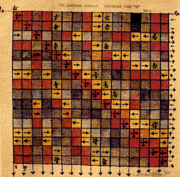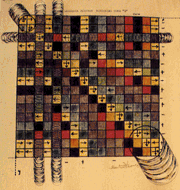RULES FOR LAMBDOMA DIAGRAMS.
The octave pattern is the same on both
sides of the diagonal.
The progression is two spaces
four spaces
eight spaces
sixteen spaces... a doubling.
The octave or key, F, C, G, D
or beginning tone, always divides the grid into two sections at right angles to
one another.
Still staying in the beginning tone, on the third square, 3/3, the doubling
takes place using three as a base.
Both horizontally and vertically a symmetry takes place so that
mathematically and visually a mirror image is sustained.
The ratios 1/2, 2/4, 3/6, 4/8, 5/10, 6/12, 7/14, 8/16 and their inversions
fan out in an ever increasing distance from the diagonal, at angles of 22 1/2
degrees.
The ratios of 2/8, 3/12 and 4/16 and their inversions, fan out at angles of
approximately 11 degrees (1/2 of 22 1/2)...
Complementary colors are like
cadences in music.
The complementary colors seem to always proceed by
doubling no matter what the beginning tones in music.
Whereas the beginning
tone is always perfectly symmetrical on the horizontal and vertical, the
following tones such as the 5th and 3rd are non-symmetrical.
For instance,
there are three vertical bands to one horizontal band dealing with 5ths, 1/3 and
2/3, 4/3, 8/3, 16/3 in the first vertical column.
|


